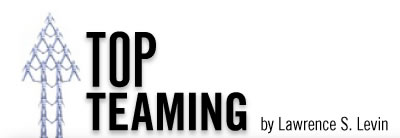Top Teaming – An Informed Point of View
“The measure of a person’s intelligence is not is what she/he knows, but by the quality of the questions he/she asks.”
As we continue to work with Leadership Teams across a variety of industries, we repeatedly observe some key similarities among successful leaders.
One of the most often observed, but rarely written about traits of successful, innovative leaders – those who operate well in what we call the Now (excellence in operations and profitability), the New (strategic foresight, change, and innovation), and the Next (aligning an organization around the critical priorities) is the ability to ask the right questions of their teams.
What differentiates that leader – the one who is curious, who raises the important questions, who challenges their team to think deeply and together from many other leaders who manage more narrowly and create more careful and constrained teams?
Joel Koblentz, who has deep experience in advising Boards and CEO’s in recruiting top leadership, begins by asking 3 critical questions:
- “What are the cultural characteristics of organizations that consistently make solid/well informed judgments?”
- “Why do decisions too often fail to deliver value even with leaders who prize ‘learned discovery?’”
- “What other factors do great leaders possess that they utilize in making make or break decisions?”
Joel’s view is that the “secret sauce” – what differentiates top leaders is curiosity,
He writes:
“The DNA of curiosity has more to do with the human spirit than something learned. It adds that special dimension that the best leaders naturally utilize to draw out the span of opportunity, issues and challenges to make truly informed decisions, minimizing unintended consequences that too often yield unacceptable results.
We know that leaders with curiosity will “demand” it in their top teams and “bake” it into the culture of the way decisions are reached. In those cultures, curiosity and continual relearning is prized and the reach toward value is very clear.
In our view, this dimension is a point of separation between those CEOs that can get the job done and those that can lead and achieve exceptional value.”
You can read Joel’s full article here http://www.koblentzgroup.com/guidance/entry.php?pid=62
What do you think? Do you see this natural curiosity in your leadership, in your teams, in your culture, in yourself?
Stay tuned. As we continue to look at what differentiates great leaders and Top Teams, we’ll explore how curiosity impacts the ability to harness Collective Intelligence (CI) which is a foundational underpinning for agile and innovative organizations.
